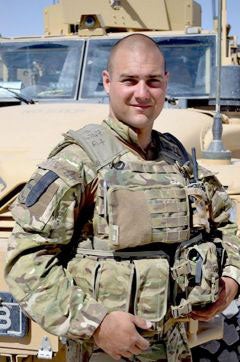The Helmand handover begins – and with it comes a leap into the unknown
Kim Sengupta finds fear among Afghan forces as they prepare to take control of security in Lashkar Gar

Your support helps us to tell the story
From reproductive rights to climate change to Big Tech, The Independent is on the ground when the story is developing. Whether it's investigating the financials of Elon Musk's pro-Trump PAC or producing our latest documentary, 'The A Word', which shines a light on the American women fighting for reproductive rights, we know how important it is to parse out the facts from the messaging.
At such a critical moment in US history, we need reporters on the ground. Your donation allows us to keep sending journalists to speak to both sides of the story.
The Independent is trusted by Americans across the entire political spectrum. And unlike many other quality news outlets, we choose not to lock Americans out of our reporting and analysis with paywalls. We believe quality journalism should be available to everyone, paid for by those who can afford it.
Your support makes all the difference.The reaction was of shock and sympathy, mixed with a sense of foreboding. The Afghan soldiers stressed how they were saddened that someone from their ranks had killed a member of the British forces. But, they warned, this was part of a Taliban campaign of infiltration and murder which was likely to continue on its bloody path.
The security of Lashkar Gar, the capital of Helmand province and the centre of the UK's operations in the country, will be handed over to the Afghan government tomorrow. It is a move of symbolic as well as strategic significance, paving the way for the West's disengagement from this long war.
The death of 24 -year-old Lance Corporal Paul Watkins from 9th/12th Royal Lancers (Prince of Wales's) during a routine patrol was the latest grim instance in which an Afghan soldier had turned his gun on a supposed ally and mentor. It also follows a string of assassinations in the run-up to the transfer of power. The attacks have claimed a number of prominent victims, including President Hamid Karzai's half brother, Ahmed Wali, and a key ally, Jan Mohammed Khan.
Last night the family of L/Cpl Watkins, from Port Elizabeth, in South Africa, said in a statement spoke of how proud they were of him.
Lieutenant Colonel Giles Woodhouse, Commanding Officer Brigade Advisory Group and 3rd Battalion The Mercian Regiment (Staffords) mentoring Afghan forces, added: "L/Cpl Watkins gave 100 per cent in all that he did. He died assisting the Afghan National Army to better protect the population."
Another member of the UK forces was killed yesterday in Helmand. The soldier, from 1st Battalion The Rifles died in Nahr-e-Saraj when an improvised explosive device blew up.
Whether the handover of Lashkar Gar and other areas succeeds will depend largely on the capabilities of the Afghan army and police. At the Shorabak training centre in Helmand, soldiers, being mentored by UK forces, and about to go into the field, insist that they will not falter. There was, however, violence and danger ahead, Sergeant Ayatollah Rustum stressed.
"The Taliban sent someone to join the army and kill the British soldier. We feel very sorry for him. The Taliban want to divide us. They will keep trying to do this" he said. "The people who do the checks on men joining our army must be very careful."
One way to maintain security, said 29-year-old Sgt Ayatollah, from Kandahar, would be for the different ethnic groups in the army to stick to themselves. "Tajiks will know the background of other Tajiks, Uzbeks of Uzbeks, Pashtuns of Pashtuns". Then he shook his head. "But no, that means we shall be divided, and the Taliban would have won."
What exactly led to the death of L/Cpl Watkins remain unclear. The UK's Task Force Helmand refused to make any further comment beyond saying that that the matter is under investigation. Afghan officials, however, have named the rogue soldier as Abdul Jalil, of the 2nd Kandak, 3rd Brigade of the 215 Hero Corps, who carried out the shooting using a sandstorm as cover, injuring two other British soldiers and then stealing some rifles before disappearing.
Abdul Sattar, 24, a farmer from Takhar who has joined the Afghan army, maintained: "We don't have any big problems with the British. In fact the training is very good, especially the weapons training. Maybe that is the reason they did this killing. But how did this killer get through the checks?"
"But the Taliban cannot win. Even after Isaf leaves [at the end of combat operations in 2014] we shall continue to fight, even it takes 10, 20 years. These people are being backed by Pakistan. They will not get our country."
Three members of the Royal Gurkha Rifles were killed by an Afghan soldier, Talib Hussein, at Nahr-e-Saraj in July last year. The previous November five other British soldiers were shot by another Afghan soldier. Following the killings, a number of British soldiers expressed their apprehension about being around Afghan soldiers with guns. The Shorabak camp is run by the UK's Brigade Advisory Group whose members are expected to acquire knowledge of Afghan culture. One of the instructors, Sergeant Ronnie McDonald said: "I can understand the initial reaction of some. But these are isolated incidents."
Join our commenting forum
Join thought-provoking conversations, follow other Independent readers and see their replies
Comments